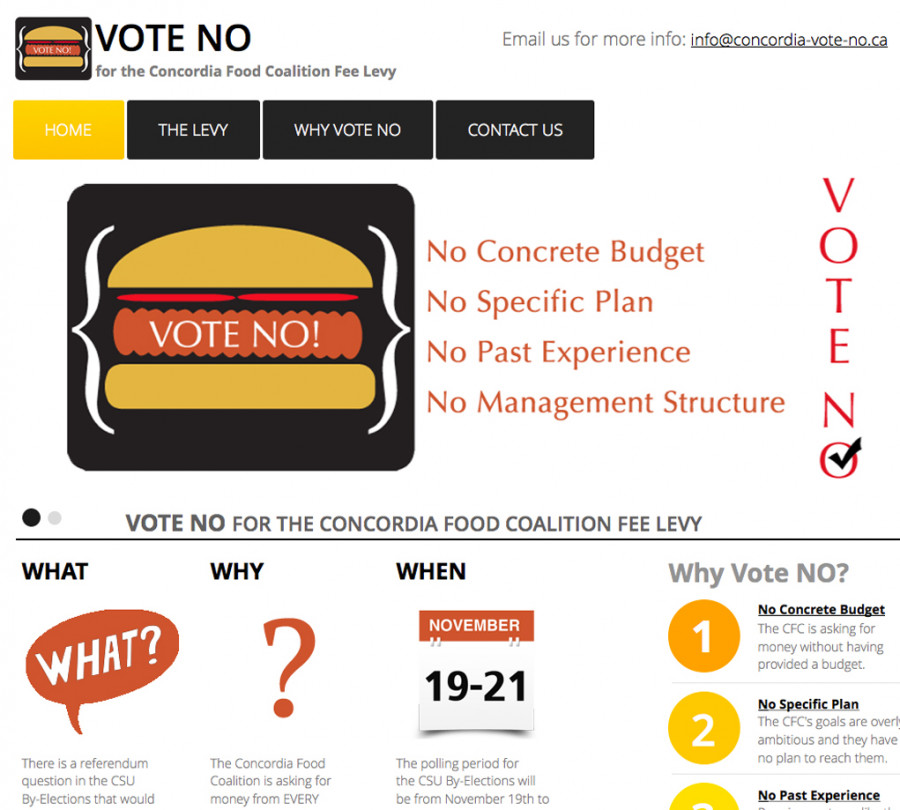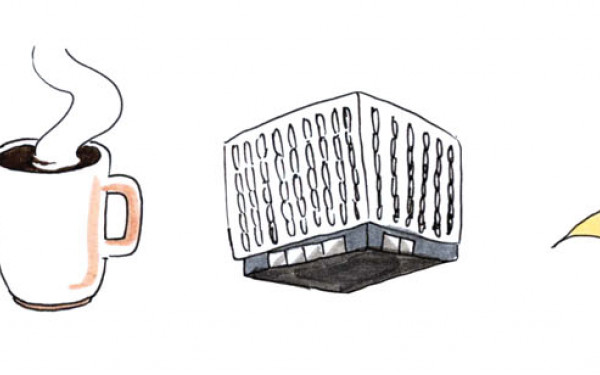Food Group Faces Opposition at Crunch Time
‘Illegal’ ‘No’ Campaign Unveiled Just Before Byelections
The last time undergraduates went to the polls, support for the Concordia Food Coalition seemed to be unilateral.
A referendum question asking undergraduates if they wanted the Concordia Student Union to “actively support the new affordable, sustainable, student-run food service initiatives on campus” passed with an overwhelming 90 per cent in favour during the CSU general election in March.
“[Concordia’s exclusive food services contract with Chartwells] expires in 2015 so we wanted students to have a say in what comes next,” explained CFC member Gabriel Velasco.
More students cast a supporting vote for the CFC’s referendum question than for any executive or councillor position that year.
It was also the largest tally of voters out of all the referendum questions posed that election.
But come fall, things got a little more complicated.
The Community Food Coalition—known to students as the Concordia Food Coalition, despite not having the legal permission to use the Concordia name—began collecting petition signatures late in September to get on the ballot for the CSU’s then-unscheduled byelection—already too late according to the CSU’s own rules.
The student group is seeking to remove Chartwells—the world’s largest provider of both school and prison cafeteria food—as Concordia’s sole food services provider, and replace it with student-run entities.
A special council meeting was scheduled to approve the CFC’s question in time for the fall byelection; however, there was another problem.
It took a week and an external status check by the Dean of Students to verify over 260 of the petition’s 952 signatures.
With all of this behind it, the CFC was ready and mobilized for the byelection campaigning period.
Then, with no perceivable warning, its campaign found itself with an opponent.
Last week, a campaign speaking out against the proposed CFC fee levy—deemed “illegal” by CSU Chief Electoral Officer Andre-Marcel Baril—surfaced online, calling on Concordia students to vote “no” to the eight cents-per-credit levy.
Concordia-vote-no.ca went live on Nov. 11, according to website registration data publically available from the Canadian Internet Registration Authority.
A Twitter handle was also created for the campaign.
The resulting social media attention prompted Baril to request posted links to the campaign be taken down from the Facebook page of the Commerce and Administration Students’ Association, which saw significant debate about the campaign.
According to a principal organizer of the “no” campaign—who spoke to The Link on condition of anonymity—group members equated the request to an attempt at being silenced.
They said members of the unauthorized campaign currently hold positions on various student groups and fee levy organizations and could face repercussions if they are publicly identified, but they still felt compelled to speak out against the CFC’s fee levy campaign.
“In real world politics, companies [during an election campaign] couldn’t spend money against a candidate legally in Canada, but as citizens at large, we can post information on the web, whether factual or not, to try to sway public opinion,” they explained.
“That’s what I think we’re doing. We’re not funded by anyone; I’m paying for this out of pocket. We’re just trying to get the information out there.”
Chapter 9 of the CSU standing regulations, which outlines sanctions and disqualifications for election candidates and referenda, does not include any policy pertaining to unapproved campaigns or referendum committees—regardless of whether they are for or against a CSU-approved campaign.
However, in all cases, any repercussions must be rendered and delivered by the CEO.
Baril refused to provide comment on the “no” campaign until after votes had been cast and the results were in.
“Doesn’t Deserve It”
According to the “no” campaign organizer, the CFC’s fee levy plans do not have enough foresight.
“No” campaign supporters say they are worried by what they see as a lack of concrete plans and budgeting, adding they believe it is irresponsible to be asking for tens of thousands of dollars from students now when their primary goal—replacing Chartwells on campus—is thwarted by the university reaffirming their current food service contract.
“It’s an honourable goal to want to democratize food on campus—I think that’s how they are portraying it—it’s just really on the financial side we have questions,” they explained.
“The group doesn’t deserve the money now,” they continued. “It’s not to say in the future they won’t, but with the information they presented they can’t expect students to give them a fee levy.”
The CFC expects to receive about $60,000 from the fee levy per year, according to Velasco. He says the number is only an estimate, based on similarly sized levies collected by other groups at Concordia.
This figure would require the roughly 36,000 undergraduates at Concordia to complete an average of about 21 credits per year.
Appearing last week on The Link’s weekly radio show, Link Radio, Velasco also countered claims the CFC is fiscally and operationally ill-prepared for the future.
He said the coalition has short-term and long-term goals, but because negotiations for a new food service contract won’t be completed until at least some time next year, those plans are subject to change.
The major short-term project the CFC is currently working on aside from its food services negotiations is establishing a student-run co-operative at the CSU-owned Hive Café at the Loyola campus, where Velasco says the CFC has already developed a business plan, a menu and secured construction agreements and funding.
Speaking to Shadows
Because an illegitimate campaign is restricted from utilizing CSU space and resources to promote its position—coupled with the anonymity of the campaign organizers—Velasco says it has been difficult to have a debate between both sides.
“It’s a little disappointing it had to be done in a sort of illegal way according to student politics. It would have been nice to actually have a legitimate ‘no’ campaign so we could have a real debate on this question rather than just be throwing slander both ways,” he said.
But by the time the members of the “no” campaign had heard about the CFC’s fee levy referendum question, the Nov. 1 deadline to establish an official “no” committee to campaign against it had passed, according to the committee member.
They also learned after the fact they could come forward at a CSU council meeting after the deadline to motivate for a legitimized campaign.
Like the campaign against it, the CFC was also late at times during its push for a fee levy.
The coalition did not make its intentions known that it would be seeking a fee levy until after the required two-months of notice.
But with a majority of councillors openly supporting the CFC’s initiatives and ultimate goals during the council meeting, the question was approved for balloting.
Council used a notwithstanding clause in its regulations to do so.
Despite missing the deadline to be a recognized committee, the “no” committee member says they believe the guerrilla campaign tactics did their job.
“I think we did what we could, a lot of students […] are more aware of it,” the member said.
“We tried to reach out to other groups on campus to promote this [campaign], but it’s really up to them if they decide to or not.”


_697_1050_90.jpg)
_600_832_s.png)



